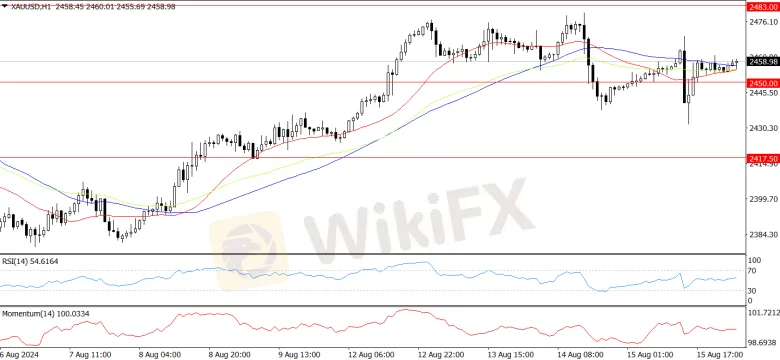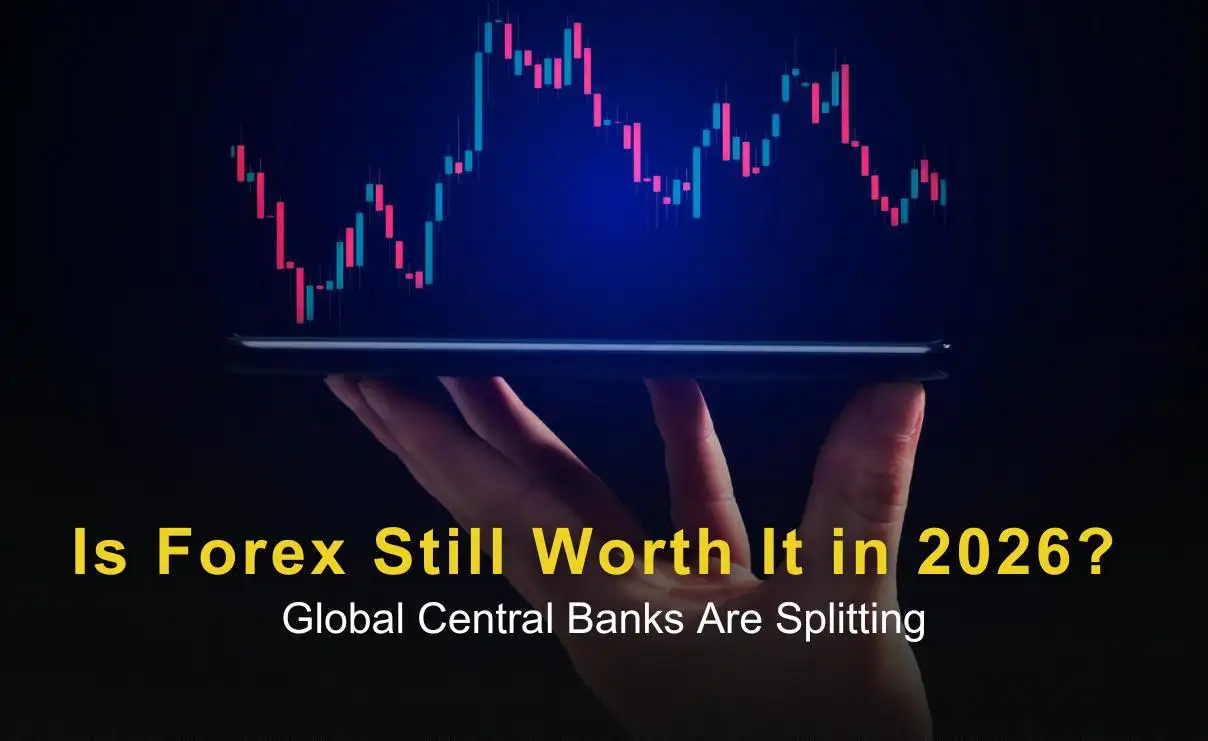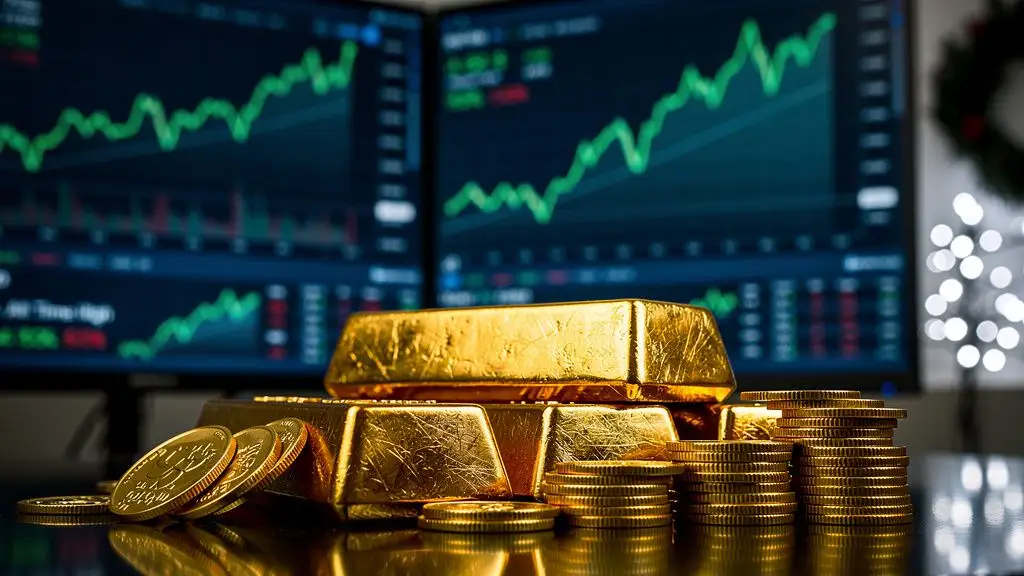KVB Market Analysis | 16 August: USD/JPY Forecast: Short-Term Bearish Trend Amid Dollar Consolidation
Abstract:This year's arbitrage gains have been erased, with 65%-75% of these positions closed. The dollar's reaction has been as expected but slightly disappointing, with a significant 100 basis point rise in U.S. short-term interest rates impacting it. JPMorgan has reduced its dollar forecasts, now predicting USD/JPY at $146 in Q4 2024 and $144 in Q2 2025, down from $147. Despite a weakening job market, other economic data remains strong.
Product: XAU/USD
Prediction: Decrease
Fundamental Analysis:
On Wednesday, gold prices gave up earlier gains and dropped by as much as 0.9% after U.S. inflation data showed that inflation eased in July. Despite the drop, gold remains close to the record high it reached last month. So far this year, gold prices have risen by 19%, mainly due to optimism about monetary easing and central banks buying more gold. After the U.S. data was released, the U.S. dollar rose against other currencies, making gold more expensive for holders of other currencies. Additionally, the yield on the 10-year U.S. Treasury bond also increased significantly.
Technical Analysis:
The daily chart for XAU/USD shows the pair is still trading within its usual range. Although it's trading higher, it recorded a lower high and a lower low, which is often seen as a bearish signal. Technical indicators have slightly turned down but are still in positive territory, reducing the chances of a significant drop. The pair continues to trade above all its moving averages, with the 20-day SMA flat and above the bullish 100 and 200-day SMAs. Overall, a sharp decline seems unlikely.

Product: USD/JPY
Prediction: Increase
Fundamental Analysis:
The gains from this year's arbitrage trades have been wiped out, with various broad bank indicators showing that 65%-75% of these positions have been closed. The dollar's reaction has been somewhat expected but also slightly disappointing. A 100 basis point rise in U.S. short-term interest rates is too significant for the dollar to ignore. JPMorgan has lowered its dollar forecasts, especially for USD/JPY, now predicting $146 in Q4 2024 and $144 in Q2 2025, down from $147. While the U.S. job market is weakening, other data remains solid. Historically, the dollar tends to consolidate after such large rate swings.
Technical Analysis:
USD/JPY trades around $147.40 on Thursday. The daily chart shows the pair is just below the nine-day Exponential Moving Average (EMA), indicating a short-term bearish trend. The 14-day Relative Strength Index (RSI) is slightly above 30, hinting at a possible correction. Support may be found near the seven-month low of $141.69 from August 5, with further downside targeting $140.25. On the upside, the pair could face resistance at the nine-day EMA around $147.53, followed by the 50-day EMA at $153.40.

Product: EUR/USD
Prediction: Decrease
Fundamental Analysis:
EUR/USD fell below the $1.1000 mark on Thursday, even as overall market sentiment improved. US Retail Sales jumped to an 18-month high of 1.0% in July, far exceeding the expected 0.3% increase and reversing the previous month's -0.2% drop. These positive signs are easing fears of a possible US recession. However, the market's expectations for a significant rate cut by the Federal Reserve have decreased. According to the CMEs FedWatch Tool, the chances of a 50 basis point cut in September have dropped to 25%, down from 70% last week. A smaller 25 basis point cut is still widely expected.
Technical Analysis:
From a technical perspective, the daily chart for EUR/USD suggests it might continue to decline. The pair is trading above all its moving averages, with the 20-day Simple Moving Average (SMA) trending upwards around $1.0890. The 100 and 200 SMAs are also pointing upward but are far below the 20 SMA, reducing the likelihood of a significant drop, especially if the $1.0950 support level holds. On the 4-hour chart, the pair shows a neutral-to-bullish stance. Technical indicators lack clear direction but remain in positive territory, as EUR/USD attempts to move back above the bullish 20 SMA after dipping below it earlier.

Product: BTC/USD
Prediction: Decrease
Fundamental Analysis:
FXEmpire analyst Ibrahim Ajibade reported that the U.S. government moved 10,000 Bitcoin, worth nearly $600 million, to a Coinbase Prime wallet. According to Arkham Intelligence, this Bitcoin was initially received in a government wallet two weeks ago and has now been transferred to Coinbase Prime‘s deposit wallet. This transaction is likely part of the $2 billion worth of Bitcoin seized by the U.S. Department of Justice from the Silk Road dark web marketplace. In early April, a wallet holding over 30,000 Bitcoin sent a similar test transaction involving a small amount to Coinbase Prime. Historically, such government-related transactions have significantly impacted Bitcoin’s price. For example, in March 2024, a similar move caused Bitcoins value to drop by 12% within 48 hours.
Technical Analysis:
The upcoming expiration of crypto options might add significant selling pressure on Bitcoin, potentially pushing its price below another key support level. Bitcoin options worth $1.4 billion are set to expire on August 16 at 8 AM UTC. The “max pain” point for these options is at $60,000, meaning most options contracts would be worthless if Bitcoin remains at this price. In the past 24 hours, Bitcoin dropped as low as $56,100. This suggests that unless Bitcoin rebounds above $60,000, the expiration could lead to more downward price swings, as options expiration usually brings more volatility to the crypto market.

Market Analysis Disclaimer:
The market analysis provided by KVB Prime Limited is for informational purposes only and should not be construed as investment advice or a recommendation to buy or sell any financial instrument. Trading forex and other financial markets involves significant risk, and past performance is not indicative of future results.
KVB Prime Limited does not guarantee the accuracy, completeness, or timeliness of the information provided in the market analysis. The content is subject to change without notice and may not always reflect the most current market developments or conditions.
Clients and readers are solely responsible for their own investment decisions and should seek independent financial advice from qualified professionals before making any trading or investment decisions. KVB Prime Limited shall not be liable for any losses, damages, or other liabilities arising from the use of or reliance on the market analysis provided.
By accessing or using the market analysis provided by KVB Prime Limited, clients and readers acknowledge and agree to the terms of this disclaimer.
RISK WARNING IN TRADING
Transactions via margin involve products that use leverage mechanisms, carry high risks, and are certainly not suitable for all investors. THERE IS NO GUARANTEE OF PROFIT on your investment, so be wary of those who guarantee profits in trading. You are advised not to use funds if you are not prepared to incur losses. Before deciding to trade, ensure that you understand the risks involved and also consider your experience.
Read more

ACY SECURITIES User Reputation: Looking at Real User Reviews and Common Problems to Check Trust
When choosing a broker like ACY Securities, the most important question is whether you can trust them. The internet has many different opinions, making it hard to know if a company is reliable or risky. This review directly answers the main question: Is ACY SECURITIES Safe or Scam? Our goal is to provide a fact-based look into the broker's reputation. We will not just give you our opinion. Instead, we will check its legal status, look at many ACY SECURITIES complaints, and compare them with positive user reviews. This complete review will break down the evidence to help you understand the real risks and possible benefits of trading with ACY Securities.

Is Forex Still Worth It in 2026? Global Central Banks Are Splitting
Entering 2026, diverging central bank policies are reshaping global FX and bond markets, while economic momentum shifts from developed economies toward India. Meanwhile, an upcoming leadership transition at the US Federal Reserve presents a key underappreciated risk that could trigger renewed volatility in interest rates and the US dollar.

Historic Breakout! Gold Price Smashes RM700 Mark
Malaysia’s retail gold prices have hit record highs, with 999 fine gold reaching RM700 per gram and 916 gold rising to RM650, driven by surging global gold prices, geopolitical tensions, and growing expectations of further US interest rate cuts.

Markets Wrap: Gold and Equities Surge to Records as Holiday Liquidity Thinness Rattles Speculative A
Global financial markets are closing the year with a stark divergence in asset performance, characterized by a robust "Santa Rally" in traditional equities and precious metals, while speculative digital assets struggle with liquidity constraints.
WikiFX Broker
Latest News
Kudotrade Review 2026: Is this Forex Broker Legit or a Scam?
BitPania Review 2026: Is this Broker Safe?
GFS Review: Reported Allegations of Fund Scams & Withdrawal Denials
XTB Analysis Report
Is EXTREDE Regulated? A 2026 Investigation into Warning Signs and Licensing Claims
Key Events This Week: PPI, Iran Talks, Nvidia Earnings, Fed Speakers Galore And State Of The Union
What Causes Stagflation?
EU Says Trump's Tariff Workaround Violates Trade Deal
$128M Crypto Scam: Chinese Suspect Nabbed in Thailand
Is AssetsFX Safe or Scam: Looking at Real User Feedback and Complaints
Rate Calc

